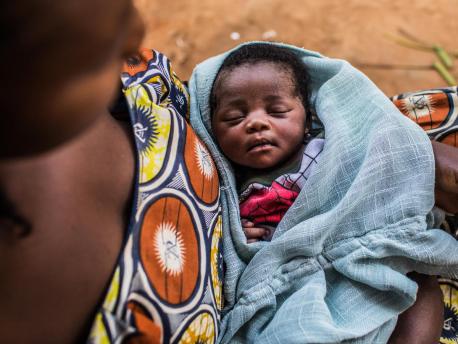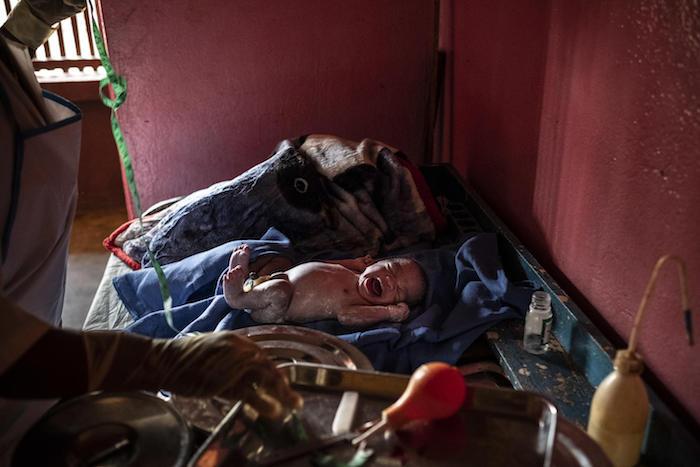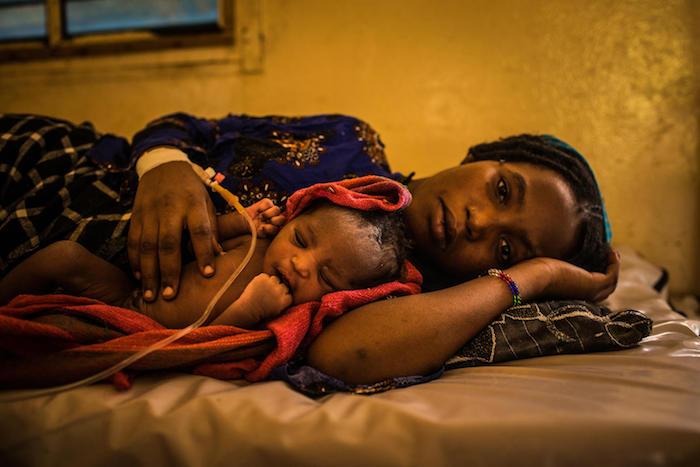
This One Basic Change to Health Clinics Could Save Millions of Lives
Improving water, sanitation and hygiene services at health care facilities could save more than 1 million mothers and newborns each year.
UNICEF and partners are working tirelessly all over the world to save and protect children.
Every day, 7,000 newborn babies die. But more than 80 percent of all newborn deaths are caused by preventable and treatable conditions including infections like sepsis, meningitis and pneumonia.
Being born in a clean environment enormously increases a baby's chance of survival. Yet one in four health care facilities around the world lacks basic water services, impacting 2 billion people, according to a new report by the World Health Organization (WHO) and UNICEF Joint Monitoring Program for Water Supply, Sanitation and Hygiene (JMP).

A newborn baby, just seconds old, has his umbilical cord cut by an assistant nurse at a UNICEF-supported hospital in Bambari, Central African Republic (CAR), on September 5, 2018. CAR has the second highest newborn death rate in the world. There is no electricity or running water in Bambari, CAR's second largest city. © UNICEF/UN0239521/Gilbertson VII Photo
One in four health care facilities around the world lacks basic water services
"When a baby is born in a health facility without adequate water, sanitation and hygiene, the risk of infection and death for both the mother and the baby is high," said UNICEF Executive Director Henrietta Fore. "Every birth should be supported by a safe pair of hands, washed with soap and water, using sterile equipment, in a clean environment."
The WHO/UNICEF JMP report, WASH in Health Care Facilities, also finds that one in five health care facilities has no sanitation service (unimproved toilets or no toilets at all) and many health centers lack basic facilities for handwashing and safe segregation and disposal of health care waste.
These services are crucial for preventing infections, reducing the spread of antimicrobial resistance and providing quality care, particularly for safe childbirth.
More than 1 million deaths each year are associated with inadequate hygiene
More than 1 million deaths each year are associated with unclean births. Infections account for 26 percent of neonatal deaths and 11 percent of maternal mortality.
The WHO/UNICEF JMP report found that just half — 55 percent — of health care facilities in the world's Least Developed Countries (LDCs) had basic water services. It is estimated that one in five births globally takes place in LDCs, and that, each year, 17 million women in these countries give birth in health centers with inadequate water, sanitation and hygiene.
Every birth should be supported by a safe pair of hands, washed with soap and water, using sterile equipment, in a clean environment. — UNICEF Executive Director Henrietta Fore
"Imagine giving birth or taking your sick child to a health center with no safe water, toilets or handwashing facilities," said Dr. Tedros Adhanom Ghebreyesus, WHO Director-General. "That's the reality for millions of people every day. No one should have to do that, and no health worker should have to provide care in those circumstances. Ensuring that all health care facilities have basic water, sanitation and hygiene services is essential for achieving a healthier, safer, fairer world."

Zara, 16, and her newborn daughter in Mao, the capital of Chad's Kanem Region in June 2018. © UNICEF/UN0260255/Tremeau
UNICEF and WHO are helping governments improve WASH services to give babies the best start in life
In an accompanying report, Water, Sanitation and Hygiene in Health Care Facilities: Practical Steps to Achieve Universal Access for Quality Care, WHO and UNICEF outline eight actions governments can take to improve the WASH services in health care facilities including establishing national plans and targets, improving infrastructure and maintenance and engaging communities.
UNICEF's Every Child ALIVE campaign calls for governments and authorities to make sure every mother and baby have access to affordable, quality care.
Top photo: Mujinga, 30, holds her 2-week-old daughter, Francine, in Kananga, Kasai-Occidental Province, Democratic Republic of Congo in March 2019. Francine is in good health so far, but through UNICEF's nutrition interventions, more than 220,000 children with severe acute malnutrition were admitted for therapeutic care, with a cure rate of nearly 87 percent. © UNICEF/UN0271266/Tremeau


